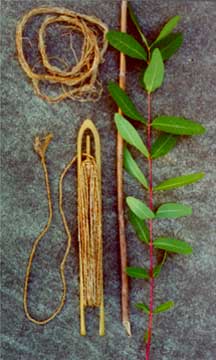

The World Was Tied Together
Creating cordage from different plant fibers
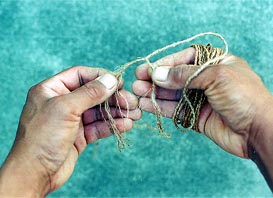
The ability to twine, braid, twist, roll or weave fibers
into cordage is one of the oldest of mankind's primitive skills.
The materials from which to ply and braid cords or ropes are in
abundance everywhere. Any fibrous material that has reasonable
length, moderate strength and is flexible or pliable can be utilized.
Lashing dwellings, making mats, containers, clothing,
snares, fishnets, hammocks and bow strings are a few of the uses
of cordage. Lacking nails, bolts and screws, and having little
to use for adhesives, indigenous cultures tied their world together.
In the class we will talk about the extraction and
preparation of various plant fibers. Techniques of plying the
fibers into cordage will then be explored. Cordage will be made
from dogbane, tule (bulrush), cattail and New Zealand flax.
Fee: $30
The Art of Calling Down the Sun
Various methods of creating fire
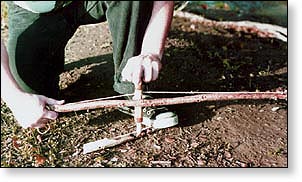 Fire was considered sacred because it was so essential
for the welfare of humans. Fire was necessary for survival. It
provided warmth, protection, cooked and preserved food, a means
to shape weapons and tools, furnished light and boiled water.
Fire was considered sacred because it was so essential
for the welfare of humans. Fire was necessary for survival. It
provided warmth, protection, cooked and preserved food, a means
to shape weapons and tools, furnished light and boiled water.
There are several methods for starting a fire. We
will cover and demonstrate the various techniques of fire by friction
(fire pump, fire saw, fire plow, bow drill and hand drill), as
well as fire by percussion (flint and steel) and compression (fire
piston).
There will be hands-on activities using the hand drill
and the bow drill. We will also construct a tinder bundle and
start a fire. Identifying various local plant materials for fire
making will be discussed.
Fee: $30
Wet Scrape Brain Tanning
Before the development of textiles, aboriginal cultures around
the world depended on the making of leather for clothing and other
goods in their daily lives.
We'll be teaching a way of tanning that is known
as wet scrape brain tanning. The procedure transforms a deer hide
into a soft and washable piece of leather, without the use of
any chemical or toxic products. Nature provides all of the necessary
ingredients for this type of tanning.
You will experience the whole process of scraping
and stretching the hide to smoking the softened buckskin. Four
students will be assigned to one hide and each person will walk
away with 1/4 of a brain tamed buckskin.
Fee: $75 for two days
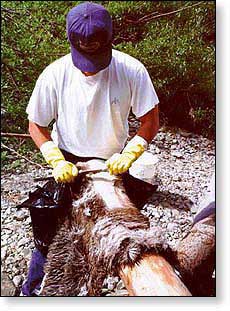 |
 |
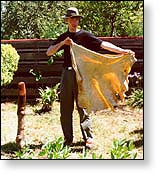 |
 |
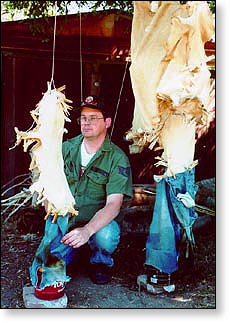 |
Making a Tree Fly
Arrow making
Historians suggest that early man progressed
from stone throwing to spear throwing, then possibly to the use
of the sling, and finally to the bow and arrow. This latter invention
was an integral part of most cultures around the world. The bow
and arrow bears witness to the fact that we have a common heritage
as hunters and gatherers. In the workshop, we will deal with the
mate of the hunter's bow . . . the lightning stick.
The basic parts of an arrow are the nock, fletching,
shaft, foreshaft (if it has one) and point. We will create a functional
arrow untilizing natural, raw materials. The points will be made
of obsidian, as well as other natural items. Due to the limited
time, the obsidian points will already be knapped.
Fee: $35


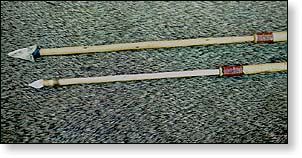
© PrimitiveWays 1998 - 2001